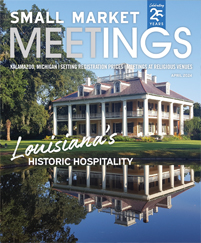It can be hard to keep up with the number of certification programs in the meetings industry, especially with so many similar designations such as Certified Facilities Executive, Certified Association Executive and Certified Special Events Professional. However, two prestigious certifications that every serious meeting professional should consider are the Certified Meeting Professional (CMP) program and the Certificate in Meeting Management (CMM).
While the CMP applies to basic knowledge of industry standards, practices and ethics, the CMM covers more specific topics such as leadership strategies and executive decision-making, appealing to ambitious individuals who hope to move more into larger leadership roles. To help you determine whether one of these certifications is right for you, we have highlighted several key characteristics of each program.
Certified Meeting Professional (CMP)
Offered by the Events Industry Council (EIC), formerly known as the Convention Industry Council, the CMP is an internationally recognized program that evaluates the expertise of meeting professionals. At present, there are over 11,000 certified CMP planners in 55 countries around the world.
“The CMP is probably the most well-known certification in the industry,” said Karen Kotowski, CEO of EIC. “In our 35-year history, we have certified more than 20,000 professionals.”
Earning the CMP is a two-part process that begins with an application to prove one’s eligibility; that is then followed by a written exam on meeting management. Planners must have at least three years of experience in the meetings industry to be eligible for the CMP program.
“Both planners and suppliers are eligible to become CMPs,” said Kotowski. “It applies to meeting professionals of all stripes, from associations to corporate to third-party planners.”
After their application is approved, candidates must complete 25 hours of continuing education, which can range from watching preapproved webinars to attending local seminars on related industry topics. Once they are ready to take the exam, candidates then locate the nearest EIC testing site, which partners with Prometric Testing. Prometric facilities are located within 60 miles of nearly 80 percent of the world’s population, so most people can find one in their area. Test takers must obtain a score of 55 to pass.
“It’s certainly challenging, but it’s a good base for anyone who wants to work in the execution and delivery of meetings,” said Kotowski.
The EIC also ensures the program’s credentials remain up-to-date with current industry practices by requiring CMP holders to renew their certification every five years.
Meeting professionals in health and similar sciences may also want to consider acquiring the Certified Meeting Planner health care subspecialty (CMP-HC), which evaluates knowledge specific to the life sciences, since there are many unique rules and regulations that apply to planning meetings in the health care field.
For newer planners, there may be some confusion about which programs provide a knowledge base about the meetings industry and which ones evaluate a pre-existing knowledge base.
“The difference between a certification and a certificate program is that a certification is a third-party validation that you already have the skills and knowledge because you’re already a practitioner, whereas certificate programs are geared toward people with no experience,” said Kotowski. “If you’re a person interested in pursuing credentials, then look at the requirements, look at the materials — ensure that you understand whether it’s certification or certificate.”











